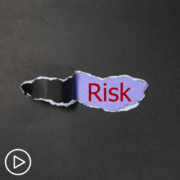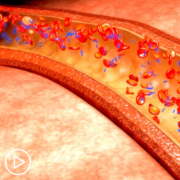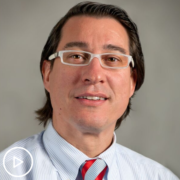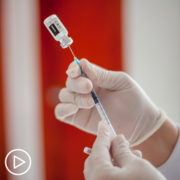Which Oncologists Are Chronic Lymphocytic Leukemia Experts?
Which Oncologists Are Chronic Lymphocytic Leukemia Experts? from Patient Empowerment Network on Vimeo.
How are oncologists designated as chronic lymphocytic leukemia (CLL) experts? Expert Dr. Ryan Jacobs explains the benefits of seeing a CLL specialist and questions to ask about their experience for your optimal care.
Dr. Ryan Jacobs is a hematologist/oncologist specializing in chronic lymphocytic leukemia from Levine Cancer Institute. Learn more about Dr. Jacobs.
Related Programs:

Why Is Early Stage Chronic Lymphocytic Leukemia Treatment Delayed? |

|

|
Transcript:
Lisa Hatfield:
So I really appreciate this question from a patient because I’m a big advocate for patients seeking out a specialist for whatever type of cancer they have, at least for the initial consult. So this patient is asking, what are the criteria used to designate certain oncologists or hematologists as CLL experts, and how much weight is given to the number of published research papers that are co-authored?
Dr. Jacobs:
So I think this question is stemming from the acknowledgment that if you can see an expert and you have that resource, it makes sense. And I always bring up to patients, if you’re going to get a hernia repair, there’s plenty of data that shows if you go to a doctor that just does hernia…go to a surgeon that just does hernia repairs versus a general surgeon that only a proportion of his practice is hernia repairs, that the negative outcomes and failures of the surgery are lower with a specialized surgeon, which makes sense. I think it’s an easy way to connect that. And there’s actually data that shows the same in CLL if you go to a doctor that focuses in CLL. And then there are, of course, different levels. But they’re going to be more likely more up to date with the recommendations, have used more of the drugs, know how to navigate the toxicities with more experience.
So it’s all about truly what labels an expert is experience. And there’s not an official club, or a test or a, you know, a voting in. It’s just essentially oncologists that are able to, with the volume of their practice, focus in CLL or hematologic or lymphoid malignancies. So it’s quite rare to be able to find somebody that only sees CLL. I don’t even only see CLL. I do see other lymphomas. And I have five other lymphoma doctors in my practice here, but even with that many lymphoma patients, I still can’t completely fill up my clinic with just CLL.
So it’s really about how focused the practice is. Patients should feel empowered to ask oncologists what kind of cancers they treat. And, of course, there are many oncologists that have to treat everything and we need those oncologists. But it should just be understood that that oncologist couldn’t justifiably call himself a CLL expert by their practice. I think, and it’s reasonable, if you ask your oncologist what they treat and they only treat blood cancers, I think it’s safer to believe them if they identify as…I don’t think anybody’s going to try to misrepresent themselves.
But if somebody tells you that they focus in lymphoid or hematologic malignancies, and focus and are an expert in CLL, I think it’s okay to trust that. But if they’re seeing…by and large, if these doctors are having to see a wide breadth of solid tumor cancers as well, I think it’s kind of difficult to say you’re an expert in one small malignancy out of all those. But, of course, there can always be exceptions.
The question on publications, you know, that’s a different…you could go to a doctor that all they do is publish and don’t see patients very much, and you may not get the best care for your CLL. So yes, I think publications can show that they’re involved in research. But at the end of the day, in terms of treating the patient, you want an oncologist that treats a lot of CLL.
Share Your Feedback
Create your own user feedback survey










